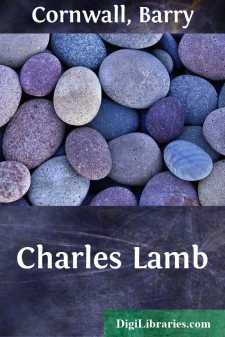Categories
- Antiques & Collectibles 13
- Architecture 36
- Art 48
- Bibles 22
- Biography & Autobiography 813
- Body, Mind & Spirit 142
- Business & Economics 28
- Children's Books 15
- Children's Fiction 12
- Computers 4
- Cooking 94
- Crafts & Hobbies 4
- Drama 346
- Education 46
- Family & Relationships 57
- Fiction 11828
- Games 19
- Gardening 17
- Health & Fitness 34
- History 1377
- House & Home 1
- Humor 147
- Juvenile Fiction 1873
- Juvenile Nonfiction 202
- Language Arts & Disciplines 88
- Law 16
- Literary Collections 686
- Literary Criticism 179
- Mathematics 13
- Medical 41
- Music 40
- Nature 179
- Non-Classifiable 1768
- Performing Arts 7
- Periodicals 1453
- Philosophy 64
- Photography 2
- Poetry 896
- Political Science 203
- Psychology 42
- Reference 154
- Religion 513
- Science 126
- Self-Help 84
- Social Science 81
- Sports & Recreation 34
- Study Aids 3
- Technology & Engineering 59
- Transportation 23
- Travel 463
- True Crime 29
Charles Lamb
by: Barry Cornwall
Categories:
Description:
Excerpt
The biography of CHARLES LAMB lies within a narrow compass. It comprehends only few events. His birth and parentage, and domestic sorrows; his acquaintance with remarkable men; his thoughts and habits; and his migrations from one home to another,—constitute the sum and substance of his almost uneventful history. It is a history with one event, predominant.
For this reason, and because I, in common with many others, hold a book needlessly large to be a great evil, it is my intention to confine the present memoir within moderate limits. My aim is not to write the "Life and Times" of Charles Lamb. Indeed, Lamb had no influence on his own times. He had little or nothing in common with his generation, which was almost a stranger to him. There was no reciprocity between them. His contemplations were retrospective. He was, when living, the centre of a small social circle; and I shall therefore deal incidentally with some of its members. In other respects, this memoir will contain only what I recollect and what I have learned from authentic sources of my old friend.
The fact that distinguished Charles Lamb from other men was his entire devotion to one grand and tender purpose. There is, probably, a romance involved in every life. In his life it exceeded that of others. In gravity, in acuteness, in his noble battle with a great calamity, it was beyond the rest. Neither pleasure nor toil ever distracted him from his holy purpose. Everything was made subservient to it. He had an insane sister, who, in a moment of uncontrollable madness, had unconsciously destroyed her own mother; and to protect and save this sister—a gentle woman, who had watched like a mother over his own infancy—the whole length of his life was devoted. What he endured, through the space of nearly forty years, from the incessant fear and frequent recurrence of his sister's insanity, can now only be conjectured. In this constant and uncomplaining endurance, and in his steady adherence to a great principle of conduct, his life was heroic.
We read of men giving up all their days to a single object—to religion, to vengeance, to some overpowering selfish wish; of daring acts done to avert death or disgrace, or some oppressing misfortune. We read mythical tales of friendship; but we do not recollect any instance in which a great object has been so unremittingly carried out throughout a whole life, in defiance of a thousand difficulties, and of numberless temptations, straining the good resolution to its utmost, except in the case of our poor clerk of the India House.
This was, substantially, his life. His actions, thoughts, and sufferings were all concentred on this one important end. It was what he had to do; it was in his reach; and he did it, therefore, manfully, religiously. He did not waste his mind on too many things; for whatever too much expands the mind weakens it; nor on vague or multitudinous thoughts and speculations; nor on dreams or things distant or unattainable. However interesting, they did not absorb him, body and soul, like the safety and welfare of his sister.
Subject to this primary unflinching purpose, the tendency of Lamb's mind pointed strongly towards literature. He did not seek literature, however; and he gained from it nothing except his fame. He worked laboriously at the India House from boyhood to manhood; for many years without repining; although he must have been conscious of an intellect qualified to shine in other ways than in entering up a trader's books....


